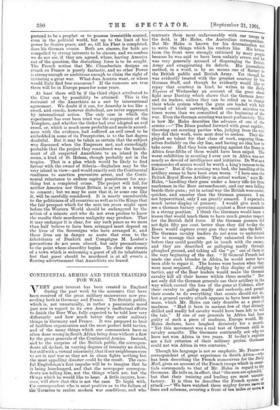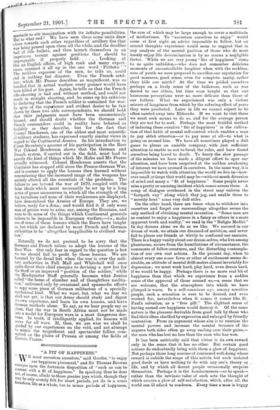CONTINENTAL ARMIES AND THEIR TRAINING FOR WAR.
VERY great interest has been created in England V during the past week by the accounts that have been received of the great military manoeuvres now pro- ceeding both in Germany and France. The British public, which is, not unnaturally, in rather a pessimistic mood just now in regard to its own Army's ineffectual efforts to finish the Boer War, fully expected to be told how very differently and how much better they order military thineps in Germany and France. It was prepared to hear of faultless organisation and the most perfect field tactics, and, of the many things which our commanders have so often done wrong in South Africa being done without a flaw by the great generals of the Continental Armies. Instead, and to' the surprise of the British public, the correspon- dents all declare, in varying degrees of intensity no doubt, but still with a. virtual unanimity, that if our neighbours were to act in real war as they act in sham fights nothing but the most appalling disaster could be the result. The care- ful Englishman's first impulie will be to imagine that he is being humbugged, and that the newspaper correspon- dents are telling him, not the things which are, but the things which he would like to -hear. A little inquiry, how- ever, will show that this is not the case. To begin with, t'w correspondent who is most positive as to the failure of the:a ermans to realise modern war conditions, and who contrasts them most unfavourably with our troops ,„. the field, is Mr. Hales, the Australian correspondent.r But Mr. Hales is known for his determination not to write the things which his readers like. His letters from the front were strongly criticised by many people because he was said to have been unfairly severe, and he was very generally accused of disparaging the British Army and exaggerating its defects. His journalistic method, .in a word, is by no means one of flattery to the British public and British Army. Yet though he was evidently treated with the greatest courtesy by the German Staff, and though he evidently would like to repay that courtesy in kind, he writes to the Daily Express of Wednesday an account of the great share fight near Dantzig which shows that the German Army and its leaders, unless they can be relied on to change their whole system when the guns are loaded with ball instead of blank cartridge, would commit mistakes ten times worse than we committed at the beginning of the war. Even the German scouting was most perfunctory. This is how Mr. Hales describes the advance of one of the armies :—" The Blues pushed forward with great rapidity, throwing out scouting parties who, judging from the way they did their work, were next door to useless. They dif;- played no talent for that class of work, exposing them. selves foolishly on the sky line, and having no idea how to take cover. Had they been operatineb against the Boers in Africa four-fifths of them would have been sniped. The worst exhibition in scouting I ever saw in Africa was not nearly so devoid of intelligence and initiative. De Wet as a commander of scouts would be worth a king's ransom to the Kaiser." But if the scouting was bad, the handling of the artillery seems to have been even worse. " I have seen the British Royal Horse Artillery in actual warfare," says Mr. Hales, " handling their guns under a heavy rifle fire from marksmen in the Boer entrenchment, and our men falling beside their guns ; yet in actual war the British were cooler, quicker, and smarter than the German gunners. I am not hypercritical, only I am greatly amazed. I expected a much better display of gunnery. I would give much to see a German battery operating against a Boer commando in a strong position. I think the Germans would learn a lesson that would teach them to have much greater respect for the British field force. If the German gunners did not fight fifty per cent. better than they did to-day the Boers would capture every gun they sent into the field." The German cavalry leaders do not srmm to understand how to manage that arm. They exhausted the horses before they could possibly get in touch with the enemy, and they are described as galloping madly through ploughed ground, and taking all the " go " out of them at the very beginning of the day. " If General French had made one such blunder in Africa, he would never have been able to repair it. The horses were beaten when they were most required. Judging by this display of cavalry tactics, any of the Boer leaders would make the German cavalry kill all their horses within three months." But not only did the German generals use their artillery in the way which caused the loss of the guns at Colenso, allow their cavalry to gallop madly and uselessly, and permit their scouts to do everything that scouts should not do, but a general cavalry attack appears to have been made in mass, which Mr. Hales can only describe as a piece of madness. " Had it been in earnest few of that divinely drilled and madly led cavalry would have been left to tell the tale." If one of our generals in Africa had been guilty of such a piece of madness, Europe would, Mr. Hales declares, have laughed derisively for a month. " Yet this movement was a real test of German skill in cavalry armpits. The Germans continually ask why we have not won Africa in two years. If to-day's exploits are a fair criterion of their military genius, Germans could not win Africa in two centuries." Though his language is not so emphatic, Mr. Peaxse—a correspondent of great experience in South Africa—who has been describing the French manoeuvres for the Daily Mail, gives an account of the French troops which in essen- tials corresponds to that of Mr. Hales in regard to the Germans. He tells us, in effect, that "the men are splendid," but that their training and leading are most unsatis- factory. It is thus he describes the French system of attack :—" 'We have watched these mighty forces rove rn lines and columns, covering a front of ten miles or more, 6 cle to stir imagination with its infinite possibilities. But to what end ? We have seen these same units draw c towards each other regardless of artillery fire that was being poured upon them all the while, and the deadlier hail of rifle bullets, and then launch themselves in an • petuous torrent against positions that should be :pregnable if properly held Looking at this an English officer, of high rank and many experi- ences, summed it all up in the one word. Pathetic.' " The reckless exposure of the men, he tells us, could end in nothing but disaster. Even the French artil- lerv, which Mr. Pearse describes as magnificent, was so handled that in actual warfare every gunner would have been killed at his post. Again, he tells us that the French rifle-shooting is bad and without method, and could not result in straight shooting, and he sums up his criticism by declaring that the French soldier is untrained for war. In spite of the experience and evident desire to be fair shown by these two able correspondents, we should hold that their judgments must have been unconsciously biassed, and should doubt whether the German and French commanders could in reality have behaved as foolishly as they describe, but for the fact that Colonel Henderson, one of the ablest and most scientific of military students, has expressed exactly similar views in regard to the Continental Armies. In his introduction to Count Sternberg's account of his participation in the Boer War Colonel Henderson shows that the German and French system, if carried out in the field, must lead to exactly the kind of things which Mr. Hales and Mr. Pearse actually witnessed. Colonel Henderson asserts that the Continent has stopped still since the Franco-German War, and is content to apply the lessons then learned without remembering that the increased range of the weapons has entirely altered all the essentials of the problems. The failure to see beyond the war of 1870, coupled with the false ideals which must necessarily be set up by a long series of peace manoeuvres in which all the strength of the big battalions and none of their weaknesses are displayed, have demoralised the Armies of Europe. They are, we believe, ready for a Jena ; and would find it if only some man of genius were to arise, say, among the Russians, and were to do some of the things which Continental generals believe to be impossible in European warfare,—i.e., make use of some of those lessons which the Boers have taught us, but which are declared by most French and German authorities to be altogether inapplicable to civilised war- fare.'
Naturally we do not pretend to be sorry that the Germans and French refuse to adopt the lessons of the Boer War. Our only fear in regard to the question is lest we too should fail to profit by those lessons. We are haunted by the dread lest when the war is over the mili- tary authorities in Pall Mall and Whitehall will once again direct their chief energies to devising a new hat for the Staff or an improved " position of the soldier," while the Headquarter Staff generally becomes what Junius called "the home of slumber and of thoughtless medita- tion," enlivened only by occasional and spasmodic efforts to copy some piece of German militarism of a specially mechanical kind. What we want, but what we fear we shall not get, is that our Army should study and digest its own experience, and learn its own lessons, and leave German methods alone. To say, as we hear le say so often, that the war in South A P Africa must not be made into a model for European wars is a most dangerous doc- trine. In truth, if intelligently applied, its lessons will serve for all wars. If, then, we are wise we shall be guided by our experiences on the veld, and not attempt to mimic the magnificent and spectacular follies com- mitted on the plain' s of Prussia or among the fields of Eastern France.







































 Previous page
Previous page